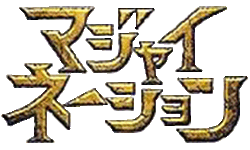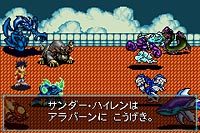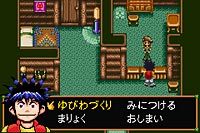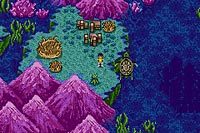|
|

|
PLATFORM
|
GBA
|
BATTLE SYSTEM
|

|
INTERACTION
|

|
ORIGINALITY
|

|
STORY
|

|
MUSIC & SOUND
|

|
VISUALS
|

|
CHALLENGE
|
Moderate
|
LANGUAGE BARRIER
|
Moderate
|
COMPLETION TIME
|
About 20 Hours
|
|
OVERALL

|
+ Good musical direction.
+ Dungeons are well designed.
+ Random encounters are done well.
- Optional content is hard to get into.
- Battle strategy is lacking.
- Needs more plot.
|
Click here for scoring definitions
|
|
|
I picked this title out of a big-store bargain bin a few months back, mainly because I was curious about the title. The only Magi Nation that I knew was a GameBoy Color title produced by an American development studio. The game in my hand had a very anime-style cover, and was for the GameBoy Advance. It only took me a few moments online to figure out that my latest minor binge purchase was the Japanese port-slash-remake.
What's been changed? Cosmetically, there's quite a difference. The color palette is much broader, and the protagonist has been altered to look more Japanese. Also, his name is Dan instead of Tony now. Otherwise, most character portraits and monsters have been updated but remain faithful to the original.
One of the unfortunate side-effects of the graphical makeover is that the long-legged, mostly proportional game sprites no longer "fit" with their surroundings, if that makes any sense. Proportional they may be, but often parts of the scenery, especially the home furnishings, no longer seem proportional to them. Still, it's a minor, personal gripe that not everyone might agree with.
 Time for a showdown
Time for a showdown
|
|
As near as this reviewer can tell, the semi-random appearance of battles as twinkling lights on the ground remains true to the original, though a read through the FAQs suggests that they now occur in more areas than before. Actual battles are another recipient of a cosmetic makeover, with the original game's quasi-cardgame style combat being replaced by a more conventional RPG battle mode.
While Magi Nation may take inspiration from card games, to the extent that half the bookcovers in the game have hint sheets referring to it, combat in this game has a marked lack of strategy. There's the option for strategy and trick, with six quasi-elemental types and skills for such things as status effects or attack reflection, but in general there is no need to take advantage of any of it. The player can construct a few tank-like monsters from bits of dream animite and then level them with ease until they can chew bits out of almost anything, irrespective of element type. A fast enough dream creature will be able to run over pretty much any enemy before a defense can be built.
Each creature in the game falls into one of six elemental types, corresponding roughly to Tree, Earth, Fire, Water, Wind, and Dark. It's not always clear what weaknesses an enemy type may have, however, and there are many element-neutral physical attacks. The way that the six types are grouped into specific regions of the game makes it difficult to build a decent combination of dream creatures early on, even if it were necessary to build a balanced party. The main reason to be aware of elemental weaknesses is defense, as a fast enemy of the wrong elemental type can cause a lot of damage. Even then, an allied creature with a good amount of speed can still win with a basic attack.
Much of the challenge in the system comes from the need for the player to carefully manage hit points. Summoned creatures take their health directly from Dan's HP pool, and any points lost through damage or expended through special skills are not recovered after battle. One-shotting an enemy will earn Dan a small amount of HP back, which helps to make up for the limited amount of space available for healing items in Dan's pack.
 All about the bling.
All about the bling.
|
|
The story begins on a good note, with Dan dumped into a strange alternate world threatened by an ancient evil. The banter is strong and comes off well even through the Japanese translation. The plot is much leaner than most might expect from an RPG, with little deviation from the primary quest to destroy the Dark Geysers polluting the land, except when necessary to open a new path to travel. While a good number of characters pop in, most barely last long enough to contribute to the plot before becoming victims of a growing series of unfortunate events.
Aside from the hero, the characters who come off as most interesting from a story standpoint were both villains -- the first is a long-suffering sidekick to a minor annoyance; the other shows up a few times and actually has the hero in a bit of a moral quandary which ends up providing most of the character development Dan gets for the entire game.
The entire game comes to around 20 hours, without the large amounts of grinding needed to summon the biggest, baddest monsters. The only two side quests in evidence take most of the game in order to complete, but are surprisingly easy to screw oneself over on. The second side-quest is nigh impossible to discover without some assistance, and can be voided in so many ways it's not even funny.
 The magnificent turtle.
The magnificent turtle.
|
|
It feels strange to say this, but this game has a minor localization issue to address. In the item and dream animite lists, everything is of course shown in hiragana and katakana, but it's all listed alphabetically as if it were still in English, with no option to manually sort things. Item searching becomes a bit counter-intuitive as a result.
Now, the music. To anyone who grew up with the digital background music of the SNES period, the music will likely be appreciated. It just has that style, and there isn't anything bad to say against it. The BGM is the most memorably aspect of many areas of the the game, in fact.
It must be said that the game's major dungeons are well designed, with some decent puzzles that were neither too easy nor too difficult. Again though, the game's dungeons are strictly tied to the main plot points of the game, with few asides or secondary plot elements brought into the mix. Except for the dungeons and the fairly linear travel routes, there isn't much exploration to be had in this game.
Magi Nation is pretty much what I expected it to be -- a Japanese-style RPG made by fans of the genre, but not exactly expanding upon the formula of the genre. The writing is well-done, but the story is on the skeletal side. The monsters are well-designed, but the battle system itself is poorly balanced and doesn't live up to the potential found in some of its options. The game's Japanese port comes across as rather derivative, but for all its faults I enjoyed my time with it.
Review Archives
|









